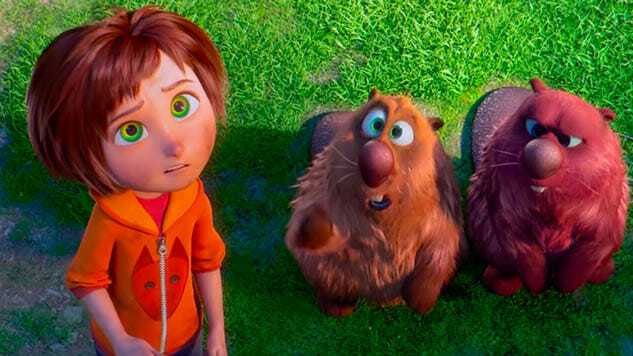Wonder Park

Mid-level kids’ fare Wonder Park is colorful, silly, wholly inoffensive, creative enough to engage the little ones and doesn’t overstay its welcome thanks to a brisk 85-minute runtime. The fact that it teaches an important and simply communicated lesson to younger children about how to deal with depression and anxiety is the thematic cherry on top.
June (Brianna Denski) is a ball-of-energy daredevil who loves testing out experimental theme park rides around her suburban town. The movie opens with June and her awkward nerd BFF Banky (Oen Michael Urbas) smashing through the entire neighborhood’s fences when a ride goes off the rails—or when, to be more honest, a junky go-cart flies off some sloppily attached wooden planks. June’s father (Matthew Broderick) pays off the neighbors’ damage and June’s saddled with more chores as punishment. I can almost hear the thoughts of every parent in the theater calculating the cost of the fences and coming up with much harsher sentencing.
But there’s a sweet reason behind June’s ambition: The tests are part of a bonding project/make-believe game between June and her mother (Jennifer Garner) as they work on perfecting their dream theme park called Wonder Park. It’s a children’s paradise full of wondrous rides and attractions, like a merry-go-round made up of giant sentient fish that can suddenly pop off and fly into the sky. It’s also run by a ragtag team of anthropomorphized animated family fare tropes. Greta (Mila Kunis) is a rule-bound pig constantly worrying about the park’s safety. Boomer (Ken Hudson Campbell) is the prerequisite dumb-dumb bear whose sole job it is to provide instant comedy relief. Steve (John Oliver) is the uptight British porcupine. Gus and Cooper (Kenan Thompson and Ken Jeong) are the manic beavers in charge of spitting clever quips and catchphrases. Their boss is Peanut (Norbert Leo Butz), a wise monkey patiently waiting for his turn to dispose of some plain but valuable wisdom to the protagonist in the third act to wrap up the themes of the story.
-

-

-

-

-

-

-

-

-

-

-

-

-

-

-

-

-

-

-

-

-

-

-

-

-

-

-

-

-

-

-

-

-

-

-

-

-

-

-

-








































